Introduction to Artificial Intelligence Multi-Organomics Series Research Achievements
(1) Application of Artificial Neural Networks in Non-Small Cell Lung Cancer Prognosis: Prof. Chen Chang's team at Shanghai Pulmonary Hospital, in collaboration with Prof. Cao Nan's team at Tongji University, has established a visualization system that can assess the prognostic differences of non-small cell lung cancer patients and recommend surgery in a personalized way (https://github.com/thoraciclang/Deep_Lung), which was published in JAMA Network Open. The study, published in JAMA Network Open, is the first study to analyze the prognosis of non-small cell by replacing the traditional Cox model with an artificial neural network model, which was highly recognized by Professor Alexander T. Pearson of the University of Chicago and evaluated as the cornerstone of intelligent diagnosis and treatment research of lung cancer.
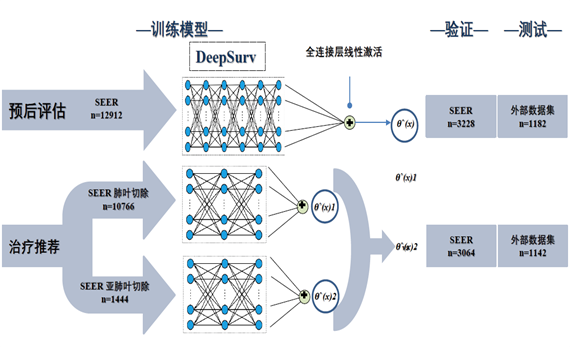
(2) Application of imaging histology in the prediction of tumor mutation load and immunotherapy efficacy in non-small cell lung cancer: Professor Chen Chang's team from Shanghai Pulmonary Hospital, together with Professor Tian Jie's team from Key Laboratory of Molecular Imaging, Chinese Academy of Sciences, have extracted 1,020 imaging histological features from the pre-surgical CT images of patients with non-small cell lung cancer by using a deep learning method, and established and validated a model that can predict the expression of tumor mutation load. Meanwhile, the prediction of survival benefit for advanced non-small cell lung cancer patients treated with single-agent immunotherapy was accomplished by combining clinical features. The study was published in The Journal for ImmunoTherapy of Cancer, the official journal of the Society for Immunotherapy of Cancer.
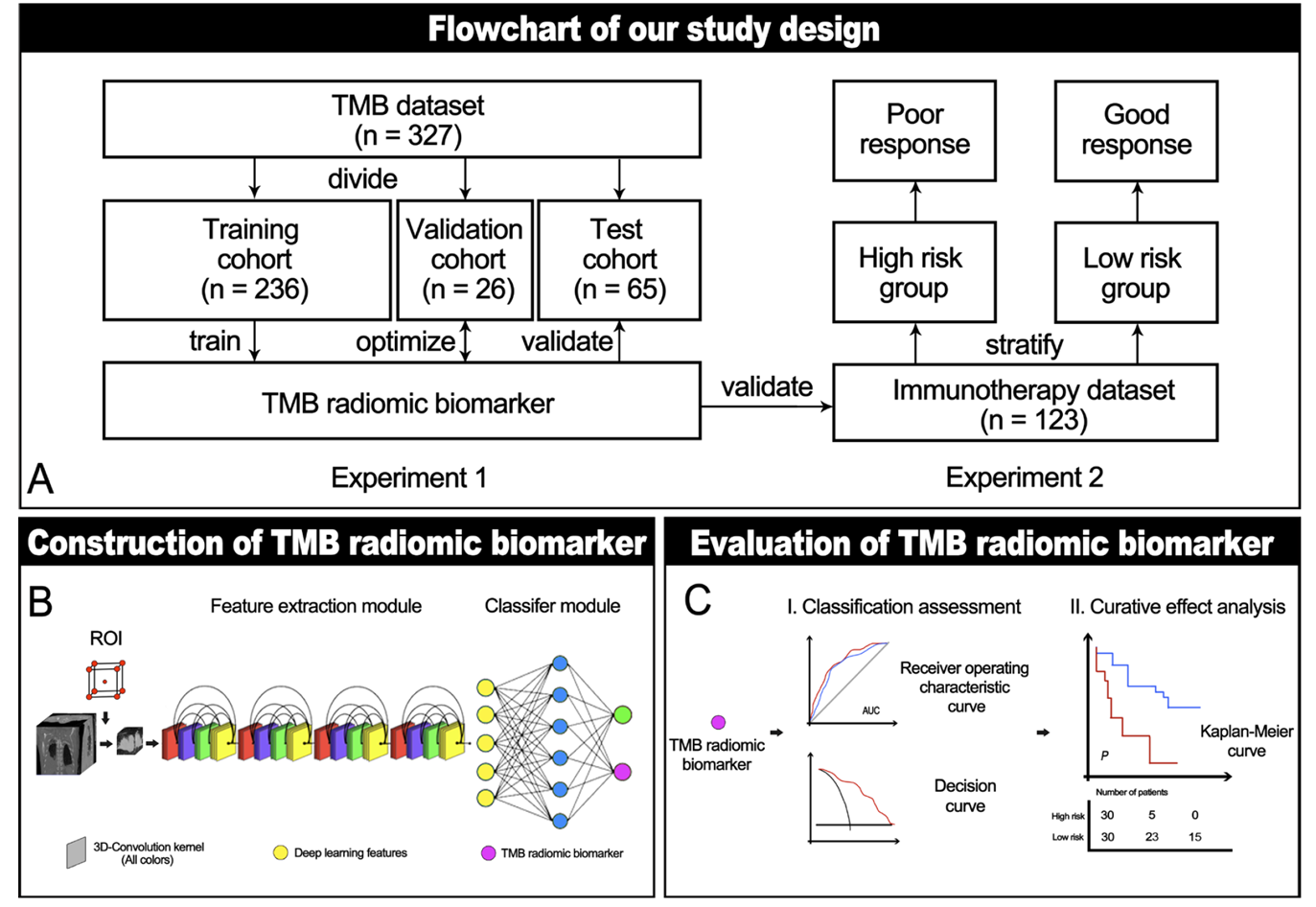
(3) Imaging histology model based on deep learning for predicting occult N2 metastasis in lung cancer: 3096 preoperative CT images of clinical stage I non-small cell lung cancer were retrospectively collected to construct a deep learning model for predicting occult lymph node metastasis, which significantly outperforms the traditional clinical prediction model. Meanwhile, it was demonstrated that the deep learning features were significantly correlated with gene mutations and metabolic pathways in lung cancer patients and could effectively differentiate patients' prognosis. The study was published in Radiology, a leading imaging journal, and Prof. Chang Min Park, director of the Department of Imaging at Seoul National University Hospital, commented that it is "an example of AI applied to solve a clinical pain point".
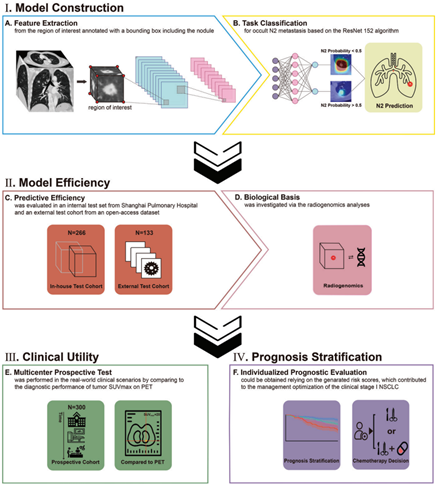
(4) Application of target lesion and its surrounding imaging features to assess the prognosis of early stage lung cancer: We retrospectively included preoperative images of 682 cases and 68 cases of pure solid early stage lung cancer from the publicly available Radiogenomics data, and accurately segmented the tumor region and the surrounding region to extract 3,292 imaging features, and then filtered and built the machine learning model for the optimal prediction of the prognosis; at the same time, we analyzed the relationship between relevant features and the regulation of tumor cell transformation, and also analyzed the relationship between the tumor and the surrounding region. At the same time, we analyzed the correlation between the relevant features and the regulation of tumor cell transformation, proliferation, migration, and immune cell activity, and published it in Radiology, a top imaging journal.
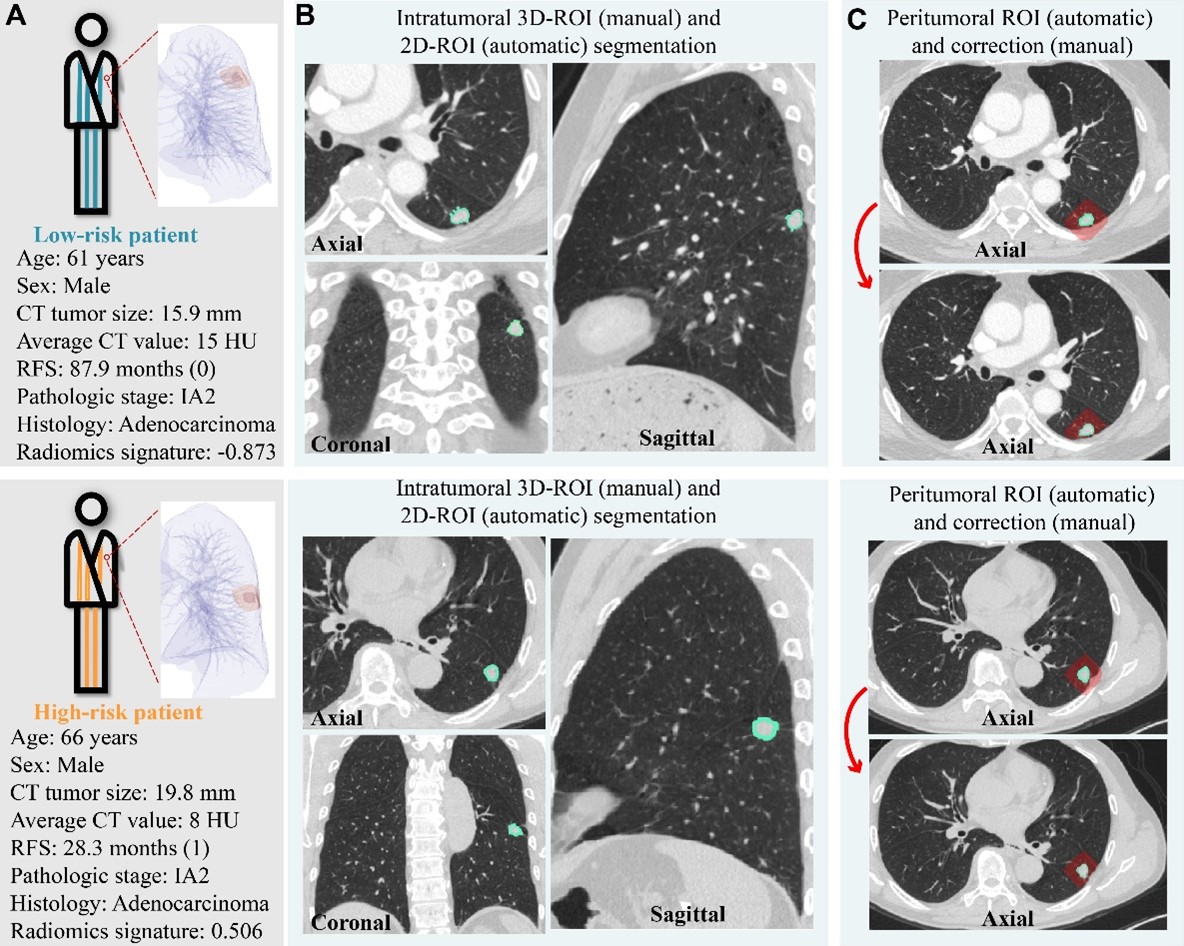
(5) Application of digital pathology images to tumor mutation load prediction: Using 1505 digital pathology images of 968 NSCLC cases and 363 digital pathology images of 211 patients from a single-center clinical clinic in The Cancer Genome Atlas, we constructed a predictive model of tumor mutation load and efficacy of single-agent immunotherapy by using AdvCS deep learning technology for feature extraction and model training. Using AdvCS deep learning technology for feature extraction and model training, we constructed a marker that can predict the tumor mutation load and the efficacy of single-agent immunotherapy, and analyzed the relationship between this marker and tumor gene expression and microenvironmental features, and the results of the study were published in iScience.
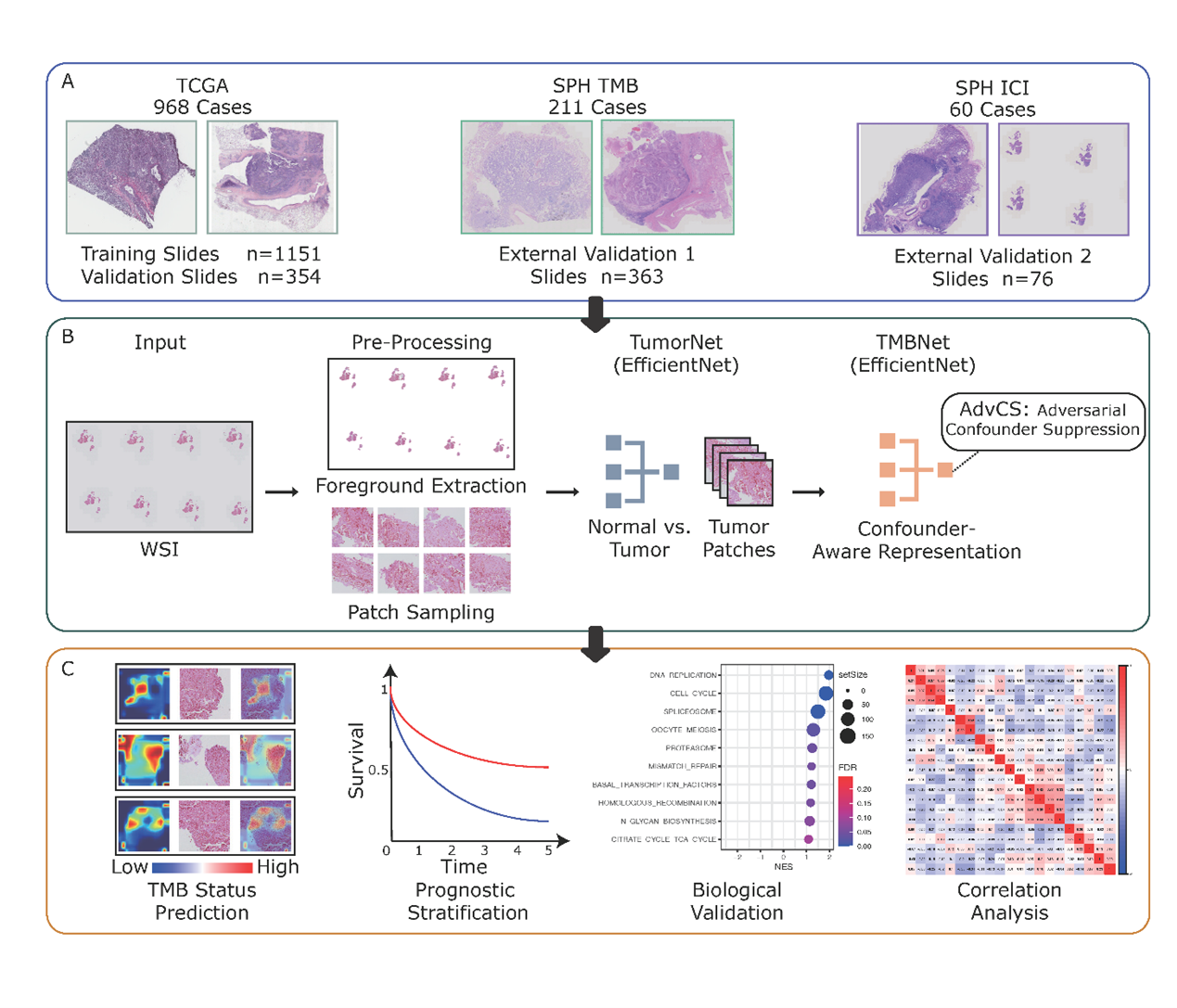
(6) Application of imaging histology in the prediction of efficacy of neoadjuvant immunotherapy for non-small cell lung cancer: Professor Chen Chang's team at Shanghai Pulmonary Hospital, in collaboration with Professor Tian Jie's team at the Key Laboratory of Molecular Imaging of the Chinese Academy of Sciences, retrospectively collected pre-treatment CT images of 274 patients with non-small cell lung cancer who were receiving immunological neoadjuvant therapy at four centers, and, in combination with the ShuffleNetV2x05 deep learning network An artificial intelligence model for predicting the main pathological remission rate was established, and the AUC could reach 0.75 in the validation set, meanwhile, the relationship between CT image features extracted by deep learning and tumor microenvironment features was analyzed, and the research results were published in EBioMedicine.
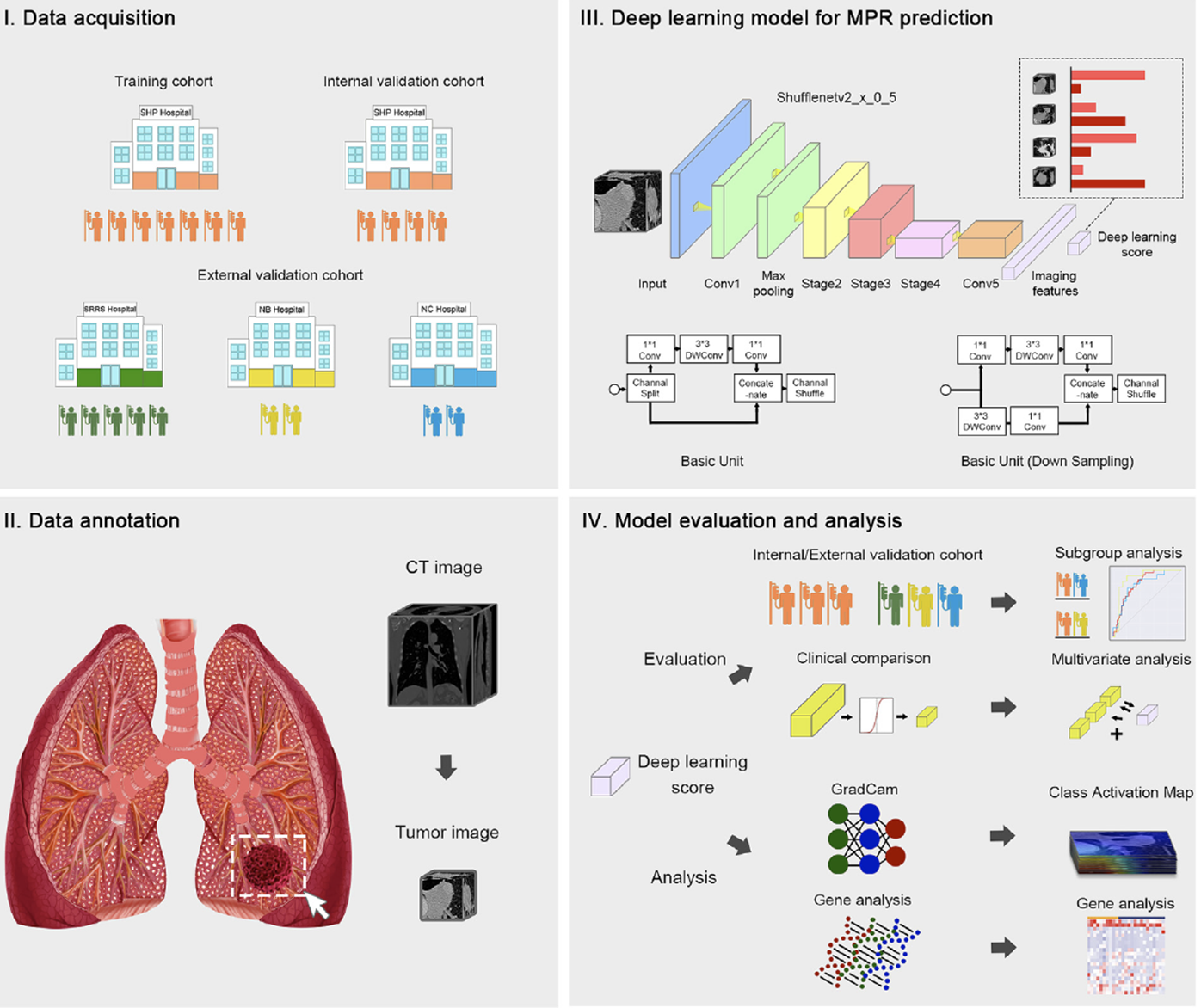
Latest articles
More- Nat Commun | Phase II clinical trial by Profs. Jiang Gening and Zhang Peng reveals safety and efficacy of neoadjuvant afatinib in EGFR-mutant non-small cell lung cancer and identifies new therapeutically sensitive biomarkers 2023-12-06
- Professor Zhang Peng's team has elucidated the molecular mechanism by which intratumoral fungal microorganisms affect the progression of lung adenocarcinoma 2023-12-06
- Int J Surg | Prof. Chen Chang's team elucidates the prognostic significance of lymph node staging based on the number of metastases 2023-12-06
- STTT | Chen Chang, Tongji University / Fang Wenjie/ Pan Weihua, Naval Medical University: Key mechanisms of gut microbes and lung transplantation stability revealed 2023-11-30
- The Department of Thoracic Surgery of Shanghai Pulmonary Hospital is actively engaged in clinical research 2023-11-30
- Introduction to Artificial Intelligence Multi-Organomics Series Research Achievements 2023-11-30
- BMC Med | Professor Zhang Peng: Treprostinil neoadjuvant therapy for stage II-III NSCLC gains further international recognition 2023-11-30
- Introduction to Surgical Laboratory 2023-11-30
